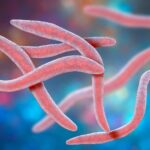• Less antibiotics, fewer asthma diagnoses
• Altered microbiota
What is already known on this topic
In parts of Europe and North America, the incidence of childhood asthma has been decreasing in recent years. Previous studies have associated the use of antibiotics in childhood with a higher risk of developing asthma.What this research adds
To test whether a decrease in the incidence of asthma is linked to fewer antibiotics, researchers used data on annual rates of antibiotic prescriptions and asthma diagnoses in British Columbia, Canada. Between 2000 and 2014, there was a 26% drop of new asthma diagnoses. The drop in asthma incidence was correlated with reduced antibiotics use—from more than 1,200 prescriptions to about 500 prescriptions for 1,000 children.Conclusion
The findings show a strong association between the prescription of antibiotics and the incidence of asthma. They also suggest that the decrease in the incidence of childhood asthma observed in recent years is an unexpected benefit of reduced antibiotic use during infancy.
The incidence of childhood asthma has been decreasing in recent years in parts of Europe and North America. A new observational study may explain why. The findings, published in The Lancet Respiratory Medicine, suggest that the recent decrease in the incidence of childhood asthma is an unintended consequence of reduced antibiotic use in early life.
Asthma is the most common chronic disease of childhood in developed countries, but the causes of its high incidence remain unclear. Previous studies have associated the use of antibiotics in childhood with a higher risk of developing asthma.
To test whether a decrease in the incidence of asthma is linked to fewer antibiotics, a team of researchers led by Stuart Turvey and David M Patrick at the University of British Columbia in Vancouver, Canada, used data on annual rates of antibiotic prescriptions and asthma diagnoses in British Columbia.
Less antibiotics, fewer asthma diagnoses
The researchers found that, between 2000 and 2014, there was a 26% drop of new asthma diagnoses—from 27.3 to 20.2 per 1,000 children. The drop in asthma incidence was correlated with a 61% decrease in antibiotic use in children under the age of one during the same period— from 1,253 prescriptions to 489.1 per 1,000 infants.
The team calculated that a 10% increase in the prescription of antibiotics increases the incidence of childhood asthma by 24%.
The researchers also found a correlation between increasing asthma incidence and the number of antibiotics exposures. Five-year-olds who had never taken antibiotics were less likely to be diagnosed with asthma than those who had taken antibiotics.
Altered microbiota
To assess how the composition of the gut microbiota relates to antibiotic exposure and asthma incidence, the researchers analyzed data from fecal samples of 917 children in the Canadian Healthy Infant Longitudinal Development (CHILD) study, which includes children recruited in four Canadian cities from 2008 to 2012.
The results show that the gut microbiota of children who had taken antibiotics had lower levels of six key bacterial families compared to that of infants who had not taken antibiotics. Among the depleted bacteria, Faecalibacterium prausnitzii is known to be an anti-inflammatory microbe that is reduced in the stool of people with asthma.
The findings suggest that gut bacteria could play a role in asthma development, the researchers say. However, the team cautions that the study only shows correlations: more work is needed to test causal relationships between exposure to antibiotics during early childhood and the development of asthma.
“Our findings suggest that the reduction in the incidence of pediatric asthma observed in recent years might be an unexpected benefit of prudent antibiotic use during infancy, acting via preservation of the gut microbial community,” the researchers say.











